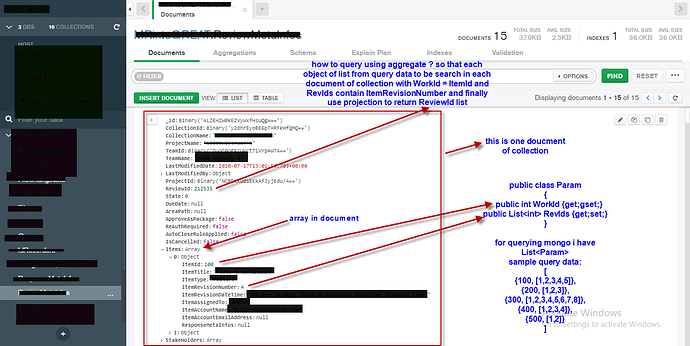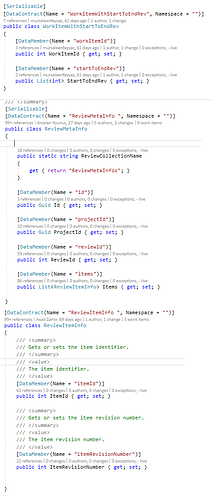Hi @Mursaleen_Fayyaz, and welcome to the forum
The question is not very clear from the post, but I assumed that you’re having some issues to filter based on a document in an array.
For example, if you have the following example document:
{
"_id": ObjectId("..."),
"ReviewId": 210,
"Items": [
{"ItemId": 100, "Revision": 4 },
{"ItemId": 101, "Revision": 5 },
{"ItemId": 101, "Revision": 6}
]
}
If you would like to filter documents in the collection where Items.ItemId is 100 and Revision is in range of [3, 4] and only output the ReviewId you could construct the MongoDB query as below:
db.collection.find({"Items":{"$elemMatch":{
"ItemId":100, "Revision":{"$in":[3,4]}
}}}, {"ReviewId":1});
The query above utilises $elemMatch query operator and will provide output as below:
{"_id": ObjectId(...), "ReviewId": 210}
Using MongoDB .NET/C# driver you could construct this query as follow:
// Class Mappings
class MyDocument
{
public ObjectId Id { get; set; }
public int ReviewId { get; set;}
public List<Item> Items { get; set; }
}
class Item
{
public int ItemId { get; set; }
public int Revision { get; set; }
}
// Query
var revisionIds = new List<int>();
revisionIds.Add(3);
revisionIds.Add(4);
FilterDefinition<MyDocument> filter = Builders<MyDocument>.Filter.And(
Builders<MyDocument>.Filter.ElemMatch(x => x.Items, Builders<Item>.Filter
.And(
Builders<Item>.Filter.Eq(y => y.ItemId, 100),
Builders<Item>.Filter.In(y => y.Revision, revisionIds)
)));
ProjectionDefinition<MyDocument> project = Builders<MyDocument>
.Projection.Include(x => x.ReviewId);
var results = collection.Find(filter).Project(project).ToList();
If this does not answer your question, please provide:
- MongoDB server version
- Example document with relevant fields
- MongoDB query/aggregation that you have tried (i.e. from mongo shell or Compass)
- Minimal reproducible code snippet that you have tried (i.e. C# code)
- Expected output
- Any error messages, if any
I’d also recommend to enrol in a free online course from MongoDB University M220N: MongoDB for .NET developers to learn more about application development in MongoDB with .NET.
Regards,
Wan.


